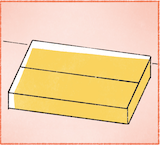
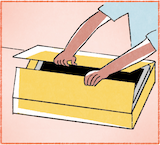
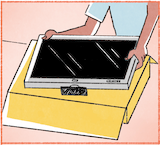
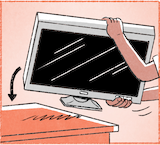
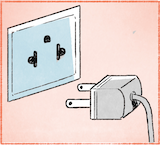
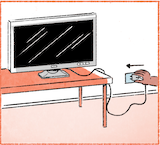
นี้คืออี่หยัง นี้คือก่อง
ก่องอี่หยัง บ่ลู้คือกันว่ามันเป็นอี่หยัง เพาะว่าบ่ได้เห็นของอยู่ในก่องนั้น
ก่องมันใหญ่บ่ ใหญ่อยู่ ก่องมันใหญ่หลาย
ก่องมันเป็นลูบจั่งใด ก่องมันเป็นลูบสี่เหลี่ยม ของที่อยู่ในนั้นอาดสิซิ้นใหญ่กะได้
13
เขากำลังเฮ็ดหญัง เขากำลังแกะก่อง
เป็นหญังเขาคือแกะก่อง เขาอาดสิเอาของที่อยู่ในก่องนั้นออกมากะได้
เขาใซ้อี่หยังแกะก่อง เขาใซ้มือของเขาแกะก่อง แล้วกะเปิดก่องออกมา
14
เขากำลังเฮ็ดหญัง เขากำลังจกเอาของมาจากในก่อง
เขาจกอี่หยังออกมา เขาเอาโทละทัดออกมาจากในก่อง
โทละทัดเคี่ยงใหญ่บ่ เคี่ยงใหญ่อยู่ โทละทัดเคี่ยงใหญ่บักคัก
เขาใซ้มือจักข้างจับโทละทัด เขาใซ้มือสองข้างของเขาจับโทละทัด
เขาเอาโทละทัดออกมาแล้ว เขาสิเอาโทละทัดไปใส บ่ลู้คือกันว่าเขาสิเอาโทละทัดไปใส เขาอาดสิเอาโทละทัดนี้ไปใซ้งานกะได้
15
เขาเฮ็ดหญัง เขากำลังญกโทละทัดขึ้นไปตั้งเทิงโต่ะ
เป็นหญังเขาคือญกโทละทัดขึ้นไปตั้งเทิงโต่ะ บ่ลู้คือกัน เขาอาดสิใซ้งานโทละทัดนี้กะได้
16
เขากำลังเฮ็ดหญัง เขากำลังเอาปั่กโทละทัดไปเสียบใส่ปั่กไฟ
ปั่กโทละทัดอันใหญ่บ่ บ่ ปั่กโทละทัดอันบ่ใหญ่ ปั่กโทละทัดอันน้อยๆ
แล้วปั่กไฟอันใหญ่บ่ บ่ ปั่กไฟอันบ่ใหญ่ ปั่กไฟกะอันน้อยๆ คือกัน
ปั่กไฟสีอี่หยัง ปั่กไฟสีฟ้า
เขาใซ้อี่หยังจับปั่กโทละทัด เขาใซ้มือของเขาจับปั่กโทละทัดไปเสียบใส่ปั่กไฟ
17
เขากำลังเฮ็ดหญัง เขากำลังเอาปั่กโทละทัดไปเสียบใส่ปั่กไฟ
เขาเอาปั่กโทละทัดไปเสียบใส่ปั่กไฟแล้วไป่ เขาเสียบแล้วๆ
ขั้นเขาเสียบแล้วๆ เขาสิเฮ็ดอี่หยัง เขากะอาดสิเปิดโทละทัดหลือใซ้งานโทละทัดนั้นกะได้
ปั่กไฟอยู่ไกจากโทละทัดหลายบ่ บ่ ปั่กไฟอยู่บ่ไกหลาย อยู่ใก้ๆ
เขาตั้งโทละทัดไว้ใส เขาตั้งโทละทัดไว้เทิงโต่ะ
โต่ะอันใหญ่บ่ อันใหญ่อยู่ แต่บ่ใหญ่หลาย กะพอดีกับโทละทัด
Link to overview page
Link to dictionary
| Isaan | Pronunciation | Tones | Thai | English/Notes |
|---|---|---|---|---|
| นี้ | ni: | HF | นี้ | 1. this 2. here |
| คือ | khʉ: | HR | คือ | 1. to be, to resemble, like, as 2. why {บักหล้าคือบ่เก็บโต่ะแน่ = [addressing a young boy] Why haven't you cleared the table?} |
| อี่หยัง | i:-yaŋ | H-M | อะไร | 1. what {นี้คืออี่หยัง = What is this?} {มื้อนี้เจ้าเฮ็ดอี่หยัง = What are you doing today?} {กินเข้างายกับอี่หยัง = What did you have for breakfast?} 2. something, anything, (in negations) nothing {บ่ต้องเฮ็ดอี่หยังอีกเลยนอกจากใส่ปุย = [we] don't need to do anything besides adding fertilizer} |
| ก่อง | gɔŋ | H | กล่อง | box, case, package |
| บ่ | bɔ: | H | ไม่ | 1. no, not 2. question particle, transforming a statement into a question Notes: spelling exception in line with common usage on social media |
| ลู้ | lu: | HF | รู้ | 1. to know 2. to understand Notes: equivalent to ฮู้ |
| คือกัน | khʉ:-gan | HR-M | เหมือนกัน | 1. also, likewise, similarly {ยินดีที่ได้ฮู้จักคือกันคับ = Nice to meet you too!} 2. in negative sentences: either {บ่ลู้คือกัน = I don't know either} {จักคือกัน = I don't know (either)} |
| ว่า | wa: | H | ว่า | 1. that, as {คำว่า X = the word X} 2. to say |
| มัน | man | HR | มัน | it (also used to refer to people) |
| เป็น | pen | M | เป็น | 1. to be, to exist 2. to be able to 3. to suffer, sth. happens to 4. เป็นหญัง[...]คือ in initial position: why? {เป็นหญังเขากะคือแปงฟัน = Why is he brushing his teeth?} {เป็นหญังเคี่ยงบินมันคือสิตก = Why is the airplane falling down?} |
| เพาะว่า | phɔ-wa: | H-H | เพราะว่า | because |
| ได้ | dai | HF | ได้ | 1. can 2. to get, to obtain 3. before verb: indicating past tense 4. บ่ได้ + verb: not |
| เห็น | hen | M | เห็น | to see |
| ของ | khɔ:ŋ | M | ของ | thing, object |
| อยู่ | yu: | H | อยู่ | 1. to be (located) at 2. yet, still 3. auxiliary indicating continuous or progressive action {ทอดปาอยู่ในกะทะ = (in the process of) frying a fish in the pan} {แม่กำลังเมี้ยนเฮียนอยู่ = mother is cleaning/tidying up the house} |
| ใน | nai | HR | ใน | in, within |
| นั้น | nan | HF | นั้น | that, there |
| ใหญ่ | ɲai | H | ใหญ่ | large, big |
| หลาย | la:i | M | เยอะ, มาก | many, much, very |
| ลูบ | lu:p | HF | รูป | 1. picture, image, photo 2. form, shape 3. clf. for pictures, images, photos |
| จั่งใด | jaŋ-dai | H-M | ยังไง, แบบไหน | how, in what manner {บักนาวมันมีลดซาดจั่งใด = Lime fruits have what kind of taste?} {เขาปิดแอจั่งใด = How is he switching off the A/C?} {เทียนใซ้จั่งใด = How's a candle used?} {สิใซ้จั่งใด = how is [it] used?} |
| สี่เหลี่ยม | si:-li:am | H-H | สี่เหลี่ยม | rectangle, square |
| ที่ | thi: | H | ที่ | 1. that, which {คนที่ยืนอยู่ฝั่งขวา = the person which is standing on the right = the person standing on the right} {เว้าคำที่บ่สุพาบ = to speak words which are impolite = to speak impolitely} 2. for ordinal numbers {ที่สาม = third} |
| อาด | a:t | LF | อาจ | 1. might, may, will 2. likely |
| สิ | si | M | จะ | future tense auxiliary {เขากำลังสิตื่น = he's about to wake up} {สิไปตะหลาด = [I'm] going to the market} |
| ซิ้น | sin | HF | ชิ้น | 1. piece, slice 2. skin {หนีบซิ้น = to pinch the skin} |
| กะ | ga | M | ก็ | 1. then, consequently 2. also |
| เขา | khao | M | เขา | personal pronoun: he, she |
| กำลัง | gam-laŋ | M-HR | กำลัง | auxiliary indicating continuous or progressive action |
| เฮ็ด | het | H | ทำ | to do, to make |
| หญัง | ɲaŋ | M | อะไร, เป็นหญัง = ทำไม | 1. what {เขากำลังเฮ็ดหญัง = What is he doing?} {ธูปเอาไว้เฮ็ดหญัง = What are incense sticks for?} 2. something, anything, (nothing) 3. เป็นหญัง[...]คือ in initial position: why {เป็นหญังเขาคือใส่บักพิกลงไปในกวยเตียว = Why is he putting chili in [his] noodle soup?} {เป็นหญังหน้าต่างมันคือเปิด = Why is the window open?} {เป็นหญังมันคือมีควนไฟ = Why is there smoke?} |
| แกะ | gɛ | M | แกะ | 1. to unpack, to unwrap 2. to remove, to take out 3. to peel |
| เอา | ao | M | เอา | to take, to give {เขากำลังเอาก่องไปซั่ง = he's taking the boxes to weigh them} {หมอกำลังเอายาให้คนป่วยกิน = the doctor is giving medicine to the patient} {เอาไว้ถ้า = is for, is used for, has the purpose of} |
| ออก | ɔ:k | LF | ออก | 1. to go out, to leave 2. out |
| มา | ma: | HR | มา | 1. to come 2. auxiliary expressing action towards the present or focal time {กะคุเฮ็ดมาจากอี่หยัง = What is the bucket made of?} {แล้วเขากะเก็บเงินจากพุนั้นมา = and then she takes the money of that person} |
| ใซ้ | sai | HF | ใช้ | to use |
| มือ | mʉ: | HR | มือ | 1. hand 2. front leg/paw (e.g., of a cat) |
| ของ | khɔ:ŋ | M | ของ | of, belonging to |
| แล้ว | lɛ:o | HF | แล้ว | 1. finished 2. already 3. and then, and next (especially แล้วกะ) 4. auxiliary for past tense |
| เปิด | pə:t | M | เปิด | 1. to open {เปิดหน้าต่าง = to open the window} {เปิดปะตู = to open the door} 2. to start, to switch on {เปิดไฟ = to switch on the light} {เปิดแอ = to switch on the A/C} |
| จก | jok | M | หยิบ | to grab, to grasp, to snatch |
| จาก | ja:k | LF | จาก | 1. from {... เฮ็ดมาจากอี่หยัง = ... is made from what?} 2. to depart |
| โทละทัด | tho-la-that | HR-H-H | โทรทัศน์ | TV Notes: pronunciation: also realized as โทระทัด |
| เคี่ยง | khi:aŋ | H | เครื่อง | 1. machine, engine 2. clf. for machines, airplanes, electronic devices etc. Notes: pronunciation: also realized as เคื่อง |
| บักคัก | bak-khak | M-H | intensifier: very, very much (variant of คัก) | |
| จัก | jak | M | จัก | 1. answer to a question: [I] don't know, don't know exactly, [I'm] not sure {พุซายคนนี้เขาเถ้าไป่ จัก จักเถ้าหลือบ่เถ้า เบิ่งบ่ค่อยออก = Is this man here already old? I don't know. I can't see clearly whether he's old or not.} {เขาเว้ากันอยู่ใส จักคือกัน = Where are they talking? I don't know either.} 2. exact(ly), what exactly {จักต้มอี่หยังกะบ่ฮู้ = I don't know what (exactly) he is cooking} {บ่ลู้คือกันจักปาอี่หยัง = I don't know either what kind of fish this is} 3. how much/many? {ต้นไม้มีจักต้น = How many trees are there?} {ตอนนี้จักโมงแล้ว = What time is it now?} {มือของเฮานี้สิมีจักนิ้ว = How many fingers do our hands have?} 4. a bit, a little bit {จักหน่อย/จักหน่อยหนึ่ง = a bit, a little bit} |
| ข้าง | kha:ŋ | LF | ข้าง | 1. side {มีหูจับสองข้าง = there are handles on both sides} 2. next to {วางอยู่ข้างๆ ก่องใบใหญ่ = it's placed next to the large box} {เขายืนอยู่ข้างๆ อีกพุหนึ่ง = he's standing next to another person} 3. clf. for body parts which come in pairs (eyes, ears, legs etc.) {เขามีตาสองข้าง = she has two eyes} |
| จับ | jap | M | จับ | 1. to grasp, to hold {เขาจับมือกัน = they're holding hands} {เขายืนจับไอติมอยู่ = she's standing, holding an ice cream} 2. to catch, to arrest {จับพุล้าย = to arrest a criminal} |
| สอง | sɔ:ŋ | M | สอง | two |
| ไป | pai | M | ไป | 1. to go 2. auxiliary indicating action extending into the future |
| ใส | sai | M | (ที่)ไหน | 1. where? {สิไปใส = Where are [you] going?} {มาแต่ใส = Where are [you] coming from?} {กะทะอยู่ใส = Where's the pan?} 2. somewhere, anywhere {ใสกะได้ = anywhere, wherever you like} |
| ใซ้งาน | sai-ŋa:n | HF-HR | ใช้งาน | to use, to put to use |
| ญก | ɲok | H | ยก | 1. to raise {ญกมือขึ้น = to raise the hand} {ญกโตอย่าง = to give an example} 2. to lift {เขากำลังญกก้อนหินขึ้น = he's lifting up the stone} |
| ขึ้น | khʉn | LF | ขึ้น | 1. to go up, to increase 2. sun: to rise {ตะเว็นกำลังขึ้น = the sun is rising} 3. more 4. bus/train etc.: to get on, to board {พุโดยสานขึ้นลดไฟเบิดแล้ว = all passengers have boarded the train} |
| ตั้ง | taŋ | HF | ตั้ง | to set/put up, to install, to establish, to erect {เขาตั้งนาลิกาปุกตอนสองโมงเซ้า = he sets the alarm clock to eight o'clock in the morning} {พัดลมตั้งโต่ะ = table fan} {ทะนาคานมันสิไปตั้งไว้อยู่ซู่หม้องเอาโลด = banks are [established/can be found] everywhere!} {ตั้งไฟ = to set up a fire} |
| เทิง | thə:ŋ | HR | บน | 1. on, on top of, at, in {เทิงโต่ะ = at/on the table} {กบมันนั่งอยู่เทิงใบบัว = the frog is sitting on the lotus leaf} {เทิงท้องฟ้า = in the sky} {มันแล่นอยู่เทิงลาง = [the train] runs on rails} {มีคนนั่งอยู่เทิงลดสามล้อสามคน = there are three people sitting in the tuk tuk} 2. up, upward Notes: pronunciation: also realized as ทัง |
| โต่ะ | to | H | โต๊ะ, เก้าอี้ | 1. table 2. chair |
| ปั่ก | pak | H | ปลั๊ก | 1. plug 2. socket |
| เสียบ | si:ap | LF | เสียบ | to insert, to put in {เสียบปั่ก = to plug in} {ใซ้ซ้อนส้อมเสียบลูกซิ้น = to pick up meat balls with a fork} |
| ใส่ | sai | H | ใส่ | 1. to put something in/on {เขาใส่บักพิกในกวยเตียวหลาย = he's putting a lot of chili in his noodle soup} {เขาบีบยาสีฟันใส่แปงสีฟัน = he squeezes toothpaste on the toothbrush} {ก่องเอาไว้ใส่ของ = boxes are there to put stuff in} 2. to wear (clothes) {เขาใส่เสี้ยแขนญาว = he's wearing a long-sleeve} 3. directed at {เอิ้นใส่กัน = to call each other/to say to each other} {หมามันเห่าใส่แมว = the dog barks at the cat} {ล้องเพงใส่ไม = to sing into the microphone} {เขากำลังซี้มือไปใส่พุซาย = she's pointing at the man} |
| ไฟ | fai | HR | ไฟ | 1. fire, flame 2. electricity, power 3. light |
| อัน | an | M | อัน | 1. thing, object 2. general clf. for objects |
| น้อย | nɔ:i | HF | น้อย | 1. few, little 2. small |
| สี | si: | M | สี | 1. color 2. colored pencil, crayon |
| ฟ้า | fa: | HF | ฟ้า | 1. sky {เคี่ยงบินมันกำลังบินขึ้นฟ้า = the airplane is taking off into the sky} 2. color: blue |
| ไป่ | pai | H | หรือยัง | question particle: yet {เขาข้ามสะพานไป่ = Has he crossed the bridge yet?} {เขากินเข้าแล้วไป่ = Has he finished eating yet?} {กินเข้าไป่? บ่ทันกิน = Have you eaten yet? Not yet.} |
| ขั้น | khan | LF | เมื่อ | when, if |
| หลือ | lʉ: | M | หรือ | or |
| ไก | gai | M | ไกล | far, distant |
| ใก้ | gai | HF | ใกล้ | near, close |
| ไว้ | wai | HF | ไว้ | 1. to keep, to put, to place, to retain, to save, to reserve {เขาเอาหัวของเขาไว้ใส = Where does she put her head?} {หมาสิเลี้ยงไว้บ้าน = dogs are kept/raised in the house} {ไก่เลี้ยงไว้ในคอก = chicken are kept/raised in a coop} {หน้ามันบังไว้ = the face is covered/not visible} {เขาเอาโทละสับวางไว้หู = he holds the phone to his ear} 2. for {นาลิกาปุกมีไว้เฮ็ดหญัง = What is an alarm clock for?} {หม้อเอาไว้เฮ็ดแนวกิน = a pot is used to make food} {ก่องเอาไว้เฮ็ดหญัง ก่องเอาไว้ใส่ของ = What is the box for? It's for putting in stuff.} Notes: see also ไว้ถ้า |
| แต่ | tɛ: | H | แต่ | 1. but {แต่บ่ต่างกันหลาย = but not very different} {แต่บ่ลู้ว่าเขาญ่างมาแต่ใส = but [I] don't know where he's coming from, see also: แต่ว่า} 2. only {ตอนนี้มีแต่ขี้ฝ้า = now there are only clouds} |
| พอดี | phɔ:-di: | HR-M | พอดี | 1. to fit well 2. appropriate, just enough, just right {กะจกบานบ่ใหญ่ กะจกบานพอดี = not a large window, just right} {พอดีมือของเฮา = just right for his hand} 3. just in time, at the right moment, just this moment {แล้วพุซายคนนี้กะญ่างมาพอดี = and the man has come just now} |
| กับ | gap | M | กับ | 1. and {ลุงกับป้า = uncle and aunt} {กวยเตียวหมูกับกวยเตียวไก่ = noodle soup with pork and noodle soup with chicken} 2. with, to {ค้ายๆ กับคำว่า ... = similar to the word ...} 3. prefix in front of foods {กับเข้า = side dishes eaten with rice} {เขากินกับกวยเตียว = he's eating noodle soup} |